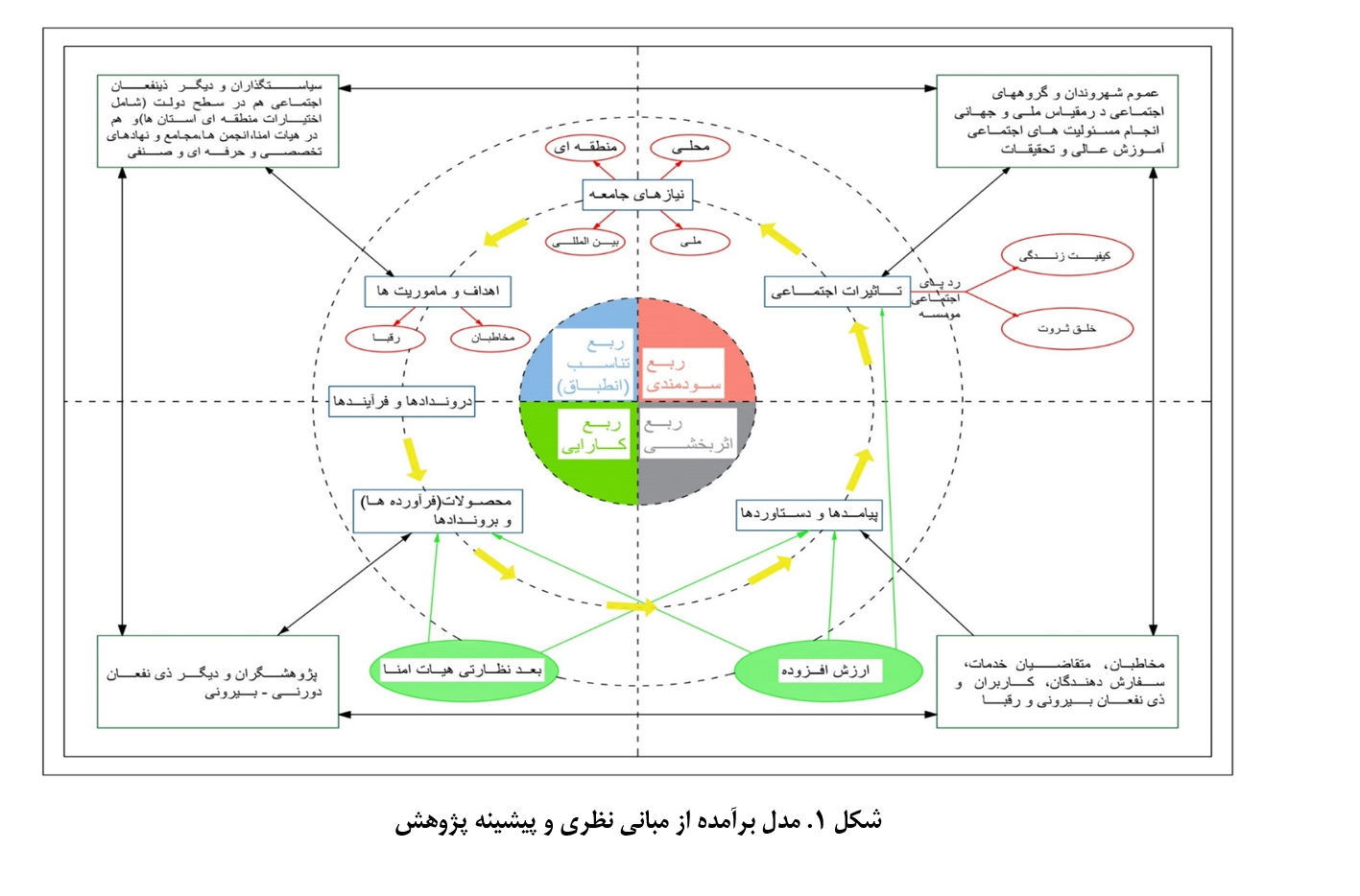National Model for Evaluation and Monitoring of Research Institutions in the Country: A Model Derived from Grounded Theory Research
Keywords:
Indicator, Evaluation, Research, Research Institutions, Model, Grounded TheoryAbstract
The main objective of this study was to present a conceptual model for evaluating and monitoring research institutions in the country. This research was qualitative in nature. The strategy of Grounded Theory (systematic version of Strauss and Corbin) was employed, consisting of open, axial, and selective coding to achieve the research-derived model. Participants included experts in policy-making or those with executive backgrounds in higher education, as well as specialists in the monitoring and evaluation of higher education. In this study, semi-structured and in-depth interviews were conducted with 30 experts and scholars in higher education, who possessed knowledge and lived experience regarding the studied phenomenon (policy-makers, senior managers, heads of research institutions, and faculty and professional members of institutions). Using a qualitative design and purposive and snowball sampling, the interviews were analyzed. Initial codes or concepts were identified after the content of the interviews was transcribed and preliminarily analyzed, and similar codes were grouped into specific categories to achieve the main themes. Titles encompassing all codes within each category were then selected. Findings indicated that the central theme of this study was the national model for evaluating and monitoring research institutions in the country. Strategies were developed based on causal conditions, contextual conditions, and intervening conditions, and the final model was presented accordingly. Subsequently, precise indicators based on the model were developed and organized into 51 indicators and 156 sub-indicators.
Downloads
References
Farasatkhah M. Higher Education Indicators. Tehran: Institute for Research and Planning in Higher Education; 2016.
Farasatkhah M, Bazargan A. Supervision and Evaluation in Higher Education. Tehran: SAMT Publications; 2017.
Farhadi A. Designing a Performance Evaluation Model for Military Universities of the Islamic Republic of Iran Army:
Allameh Tabataba'i University; 2017.
Parsayan A, Arabi SM. Human Resource Strategy: Formulation and Implementation. Tehran: Office of Cultural
Research Publications; 2014.
Saadat E. Human Resource Management. Tehran: SAMT Publications; 2014.
Farazkish M. Designing a Model for Evaluating the Process of Science, Technology, and Innovation in Iranian
Governmental Organizations: Tarbiat Modares University; 2016.
Lepori B, Jongbloed B, Hicks D. Public research funding and its implications for science, innovation, and society.
Pourkarimi J. Epistemological Governance in Higher Education. Tehran: Institute for Research and Planning in Higher
Education Publications; 2019.
Ghazinoory SS, Diousalar A. Evaluation of National Research and Development Projects: Structures and Methods.
Tehran: Institute for International Energy Studies; 2011.
Ghazinoory SS, Farazkish M. A National Evaluation Model of Science, Technology, and Innovation Based on
Efficiency, Effectiveness, and Utility Indicators. Strategic Studies of Public Policy Quarterly. 2018.
Ghazinoory SS, Nasri S. Designing a Framework for Determining the Mission of Universities, Higher Education, and
Research Institutes in the Country. Research, Technology, and Innovation in the Seventh Development Plan: Studies, Analyses,
and Proposals. Tehran: National Research Institute for Science Policy; 2021.
22nd Panel of Higher Education Foresight. The Future of Research Institutes in the Country with Emphasis on Their
Evaluation. Tehran: Institute for Research and Planning in Higher Education, 2018.
Nasri S. Examining the Challenges of Government Research Institutions in Iran with a Historical Perspective on Their
Institutional Development: A Phenomenological Study. Management Improvement. 2022(16).
Nasri S, Bikaran Behesht H, Alizadeh P, Kothari S, Farazkish M, Azadi Ahmadabadi G. Transformation in the
Function and Role of Government Research Institutions: Challenges, Requirements, and Practical Solutions. National Research
Institute for Science Policy, 2023.
Cocos M, Lepori B. What we know about research policy mix. Science and Public Policy. 2020;47.
Farasatkhah M. Qualitative Research Methods in Social Sciences with Emphasis on Grounded Theory. Tehran: Agah
Publications; 2016.
Creswell JW, Plano Clark VL. Designing and conducting mixed methods research. Thousand Oaks, California: Sage
Publications, Inc.; 2007.
Charmaz K. Constructing grounded theory: A practical guide through qualitative analysis. London: Sage publications;
Bazargan A. Introduction to Qualitative and Mixed Research Methods: Common Approaches in Behavioral Sciences.
Tehran: Didar Publishing; 2008.
Mohammadpour A. Anti-Method: Logic and Design in Qualitative Methodology. Tehran: Sociologists Publishing;

Downloads
Published
Submitted
Revised
Accepted
Issue
Section
License
Copyright (c) 2024 Journal of Study and Innovation in Education and Development

This work is licensed under a Creative Commons Attribution-NonCommercial 4.0 International License.










